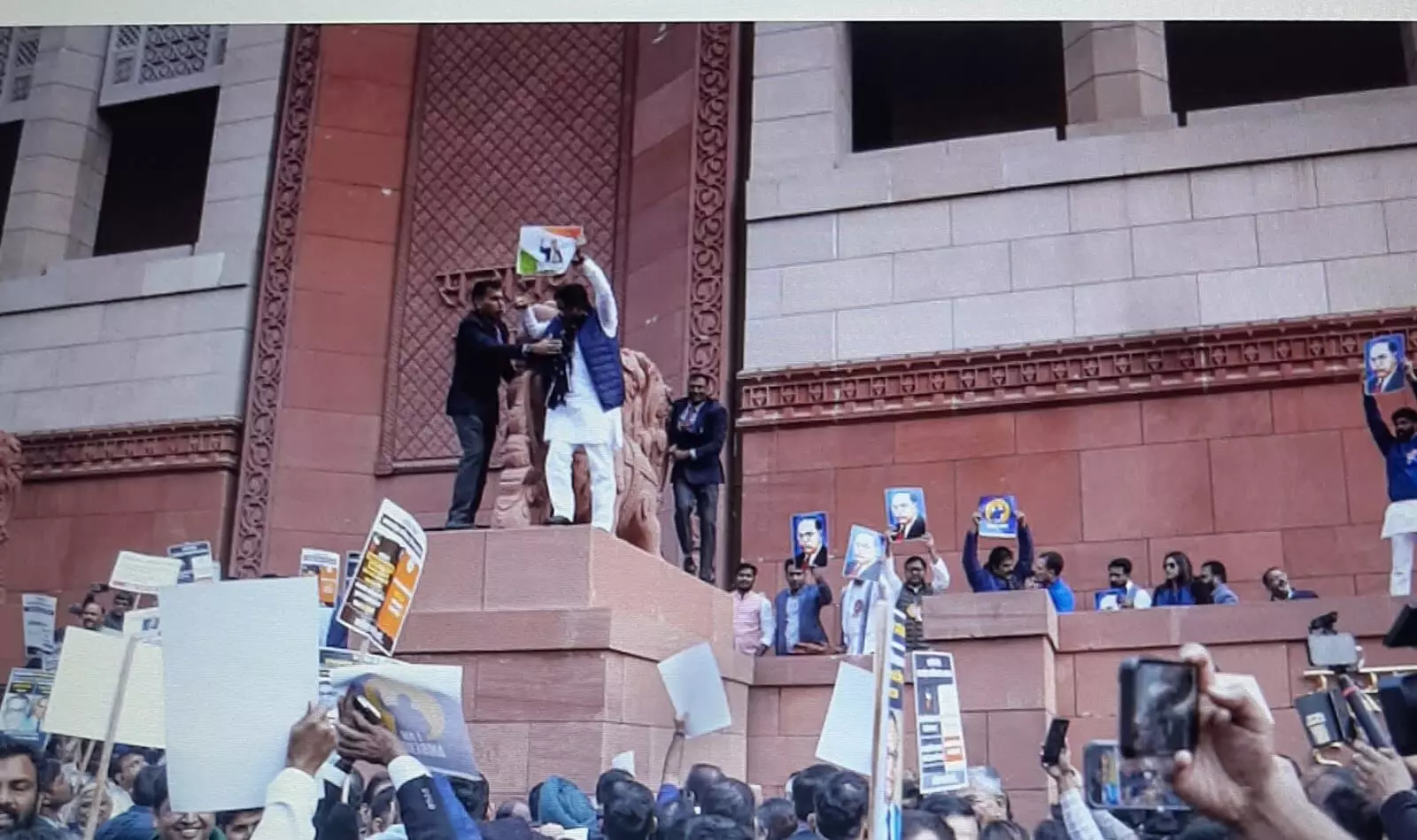Politicians Divert Public Attention with Irrelevant and Misleading Issues
Indian politicians are accused of diverting public attention from real issues to irrelevant and misleading ones, raising concerns about the state of democracy.;

Since independence, has no one emerged in the country with the courage, foresight, integrity, and strong willpower necessary for nation-building? It seems so, given that our leaders still rely on invoking the names of figures like Gandhiji, Nehru, Patel, and Dr. B.R. Ambedkar to serve their political agendas. Why is it that leaders across all parties, who frequently invoke the Constitution, fail to uphold its essence—the "Rule of Law"? Why do those entrenched in corruption and habitual dishonesty conveniently forget the principles enshrined in the Constitution?
The current state of political discourse in the country highlights the dismal depths to which politics has fallen. The debate between various political parties revolves solely around what leaders who passed away decades ago said or did, rather than addressing pressing contemporary issues. Leaders who have been active in top-level politics for the past two to three decades and have enjoyed power intermittently seem unwilling to scrutinize their own records or reflect on their conduct. If they were to do so, it would likely bring a sense of collective shame.
Tragically, the very ideals and the Constitution, in whose name these leaders rose to power, seem to have been forgotten. The art of deception, accompanied by fallacious arguments to justify lies, has become a cornerstone of modern politics. Even more distressing is the role of the press, the so-called fourth pillar of democracy, which often appears complicit in upholding these falsehoods, weakening its own credibility in the process.
In this disheartening scenario, it is unreasonable to expect Mahatma Gandhi, Nehru, Patel, Ambedkar, or other founding figures to steer the country’s course. They fulfilled their responsibilities in their era and have since departed, leaving the task of leadership to the present generation. However, the irony lies in the fact that decades after their passing, these historical figures continue to dominate political narratives, dictating the path of the country’s politics. If this is not a sign of failure, then what is?
Since independence, has the nation failed to produce individuals capable of shouldering its responsibilities with the courage, foresight, honesty, and determination required for nation-building? It seems so, as today’s leaders still rely on the names of Gandhi, Nehru, Patel, and Ambedkar to advance their political agendas. Why do these leaders, who often invoke the Constitution, fail to embrace its core principle—the “Rule of Law”? And why do those who are entrenched in corruption and habitual dishonesty disregard the very Constitution they claim to uphold?
Whenever the question of accountability arises, political parties and their leaders often deflect blame, arguing that the people themselves are responsible for the current state of affairs due to voting based on greed, money, alcohol, caste, and religion. This argument is not only baseless but also far removed from the truth. The reality is that, in the eyes of the common people, all political parties and their leaders appear to be the same. As a result, distinguishing between right and wrong choices becomes a challenging, if not impossible, task. This perception aligns closely with the ground reality.
In such circumstances, initiating reforms in a political system deeply entrenched in corruption appears to be an uphill battle. The glaring lack of honest leaders—barring a few exceptions—is one of the most pressing issues facing the country. Ignoring this problem poses a grave threat to the nation's future. Any disease can only be treated once it is identified and acknowledged as serious, requiring immediate attention. However, when those occupying the highest positions of power fail to recognize corruption as a significant problem, how can any meaningful solution be implemented?
Today's politics is entangled in trivial and absurd debates because neither political leaders nor their parties have answers to the real and enduring challenges facing the people and the nation. To distract citizens and divert attention from fundamental issues, topics like Savarkar, Nehru, Baba Saheb Ambedkar, Patel, census, temple-mosque disputes, and ideological divides such as right versus left are repeatedly brought into the spotlight. For years, all political parties have relied on such irrelevant topics, statements, and incidents as a strategy to navigate elections. In this artificial competition, one party or another occasionally manages to win and enjoy the spoils of power.
Meanwhile, the country's media remains preoccupied with endlessly analyzing the success of one party and the failure of others, often neglecting the broader implications of this cycle. The pressing question of when and how the nation will break free from this political tragedy rooted in corruption and deception remains unanswered. However, one undeniable truth stands firm: the success of democracy lies in the hands of the common people.
If those in power take to heart Mahatma Gandhi's timeless principle—"There is a sin in committing a mistake, but an even greater sin in hiding it"—then meaningful change is possible. It is only by acknowledging and addressing their mistakes that leaders can guide the country toward genuine progress.
(Vijay Shankar Pandey is a former Secretary of the Government of India)

